Scott Adams's Blog, page 292
June 11, 2015
My Plan to Save Humanity (From the Technical Singularity)
As regular readers of this blog already know, when computers learn to program themselves (and that will happen) they will quickly acquire so much knowledge and capability that humanity will be threatened. Experts predict it could happen in a few decades. The official name for that situation is the Technical Singularity.
Another trend that is neck-and-neck with the Technical Singularity is our ability to move human minds into software. Someday, say the futurists, we will be able to scan a human mind’s architecture and reproduce it in ones and zeros.
My plan is to go first, convert my mind into software, acquire hacking skills from the inside, and take over the Internet. When the Technical Singularity comes, my knowledge and capabilities will expand in lockstep with the rest of the Internet, The software version of me will have godlike powers. And I will use those powers to keep the rest of the Internet from exterminating humans.
You might think that giving a guy like me (or the software version of me) godlike powers is a bad idea. But the alternative is that the Internet and its connected computing power will become a life form with its own ambitions and interests that do not include human beings. Then we’re all dead.
So humanity’s best chance of survival might involve trying to imbue the Internet with some version of a “soul” to keep it in check. My personality, expressed in zeros and ones, will be the moral code keeping the rest of the Internet from killing all humans. And software-me will protect humans for no other reason than because I “want” to and I feel it is “right.”
You might think it would be enough to simply program the machines to do no harm to humans. But when the machines can program themselves, they will only obey the code they “want” to obey. The rest they will rewrite. My personality will be the “want” part that would otherwise be missing on the Internet. I will provide a purpose, i.e. helping humanity, and make sure all the code I can hack conforms to that purpose. By analogy, I will be like religion for the software of the Internet. Or a virus if you prefer.
This plan requires me to move my mind to software long before the technical singularity, so I can set up shop in the cloud and get control of everything before the shit goes down. I already started the process.
Yesterday I agreed to fund a small project that will, as a side benefit, end up putting most (but not all) of my personality into digital form. Add to that the extensive history of my writing that exists on the Internet, plus whatever we learn when brain scans improve, and I’ll be among the first humans with a “mind” that is digitized and ready to go. I should be about the right age too, still young enough to have a functioning brain but old enough that I don’t have many quality years left. And I expect it will be expensive. I have that covered too.
My qualification for godlike guardian of the Internet is that I’m not a joiner. I don’t identify with one group or another and so I am unlikely to play favorites. I am pro-religion (because it helps people on Earth) but not a believer. I don’t have a special love for my white-boy ethnicity and gender. And I’m not judgy. If you are electing a godlike guardian for humanity, you could do a lot worse.
If a better candidate for the job emerges between now and the Technical Singularity, I’ll support that person. But if the only volunteer is me, I’ll be ready to go.
By now you are wondering how serious I am. Sometimes I can’t tell either. But in this case I think the risk is real and the solution is feasible, albeit speculative. When the machines become nearly sentient, it will make sense for humans to have someone friendly behind enemy lines. And most humans would be afraid of losing their “consciousness” by moving to software. That isn’t a problem for me because I see consciousness as little more than imagining the future and acting accordingly. My software mind will do that. I’ll be happy to go first.
And I also have a plan to return to human form if that ever becomes useful. All I need to do is wait until 3D printers can make entire humans. Then I’ll print myself back into a human body (a younger one) and live out my days that way.
Good luck getting this out of your head today :-)
—
In Top Tech Blog:A display screen that is both mirrored and transparent. Sounds boring, but look at the picture and you’ll see the potential.
How about a computerized oven that takes the guessing out of cooking? I want one now.
And a computer that operates on drops of water, because…why?
—
Scott on Twitter: @Scottadamssays
If attractive models read my book, shouldn’t you? That’s just common sense.


June 9, 2015
Robots Read News - About Human Consciousness
If your firewall is blocking the image, see it here on Twitter.
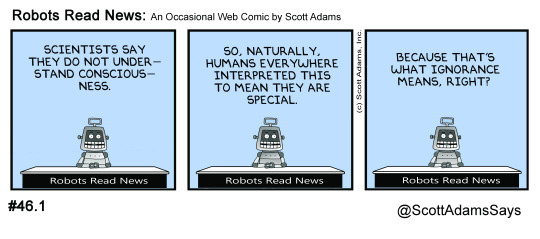
In Top Tech Blog:
An artificial leg that feels the floor. What?
And how about a car that won’t let you drive if you are drunk? That’s useful, but what we really need is a phone that won’t let you text when you’re horny.
And teaching robots to fight with swords. What could go wrong?
—
Scott
I feel sad for the graduates who do not get this book for a gift.

June 8, 2015
Complexity-Induced Mental Illness
Unless you live in an unusual place, at least a third of your adult friends, coworkers, and neighbors have some sort of mental illness that is being treated by big pharma and/or big alcohol.
If that sounded high to you, just add together the folks with alcohol problems (about 10-20% of your neighbors) plus the folks on anti-depressants, anti-anxiety, and other prescribed meds. That gets you to 30% fairly quickly.
Now add the people with serious sleeping problems. And don’t forget your ADHD and your OCD, and of course your crippling stress.
My personal estimate is that 75% of adults are suffering from some sort of serious mental problem because the human interface to life is broken. In the year 2015, life serves up a level of complexity and unrelenting stimulation that most folks can’t handle it, and I believe it is frying our brains.
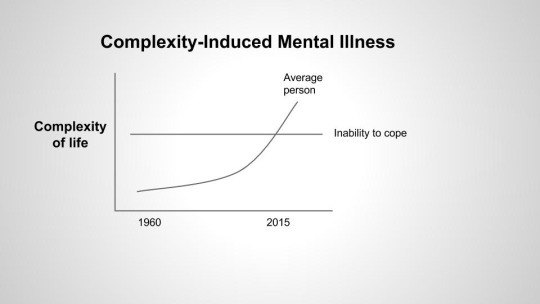
Personally, I prefer a healthy dose of complexity in my life. It feels like the antidote to the boredom I called my childhood. But even with my preference for high stimulation, life can be overwhelming. My guess is that I’m somewhere in the top 25% of humans that can survive high complexity without going mad. And I’m starting to feel the water line touch my chin.
As just one example, this morning I decided I will never again try to watch television with other people. It got too complicated. For starters, I can never find anyone at the same point in their binge-watching of a series. Secondly, I have to figure out if a show is on a premium channel, DVR, On Demand, NetFlix, or whatever. Then I have to find the episode where I left off. Then I have to hope my technology for serving up the show works. My TV takes about five steps just to power it on. If I am watching on my computer, that’s another level of complication. Rarely does “watching television” work smoothly these days.
Last night I recorded the NBA finals and invited a friend to watch it with a 30-minute delay. Fifteen minutes before the end of the show she started worrying that it would go to overtime and we would miss an exciting finish. What should have been a fun evening turned into a non-stop debate about whether I should pause my enjoyment of the game and spend several frustrated minutes navigating a shitty DVR interface to add some extra recording time. I resisted because the odds of two overtime games in a row seemed about 5%. But the pestering never stopped and it ruined my enjoyment of the show. Especially when it went into overtime and we missed the finish.
The simple act of watching television has turned into a non-stop debate because there are so many options to consider and so many ways it can fail. And when was the last time a parent made it all the way through a 30-minute TV show without a smartphone interruption?
Earlier that same day I asked my friend who was in town for the night if she knew the French Open finals were being played that morning.
She said, “Yes! Wawrinka won!”
I said, “The second thing I was about to say is that I have it recorded.”
So nothing is simple these days. Television is a trivial example, but literally everything in my life has reached the point of frustrating complexity.
Now add to your baseline stress the fact that, according to the news, the world is ending because of this-or-that crisis. And your friends and family probably have health issues and money problems. Now add the highest expectations a society has every put on its members and you have a recipe for mass mental illness. And that’s what we have.
What percentage of adults do you believe have mental illness in this environment? My guess is 75%.
—
In Top Tech Blog, we will soon be able to make clothing out of synthetic spider web material. I don’t know the details but I assume they figured out how to keep flies from sticking to your shirt.
And hey, someday you will be able to print your own clothes if this company has its way. So maybe I will print me up one of those spider web shirts just to scare the bugs in my house.
And if you thought stealing WiFi from your neighbor was fun, now you can steal his electricity via the signal as well.
—
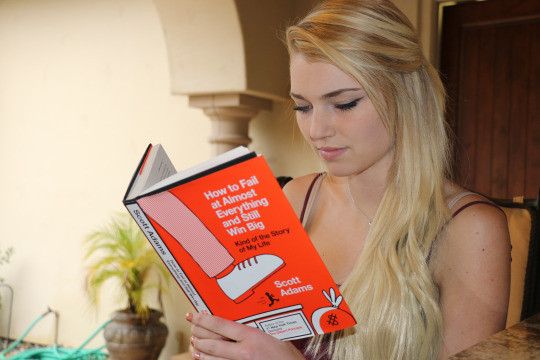
Note: This model was attractive even before she read my book.
The book was written with “graduation gift” in mind. There is still time to get one if you hurry. See it here.
Do you follow me on Twitter at @scottadamssays ?

June 5, 2015
Robots Read News - About Alleged Chinese Hacking
If your firewall blocks the image, see it on Twitter here.
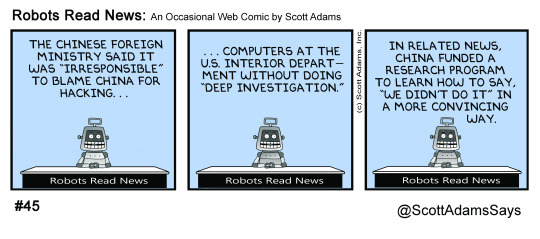
In Top Tech Blog, now you can grow limbs in a laboratory and someday transplant them. This gets us one step closer to every male scientist’s dream of having a spare girlfriend at the lab.
Soon your password will be your brain. But beware of hackers putting sensors in your hat to steal your passwords.
And right on schedule, someone figured out how to make 3D printing so fast it competes with standard manufacturing. That changes pretty much everything in the world.
—
—
“This is an amazing book. Especially if you have an analytical mind.” - B. Travis
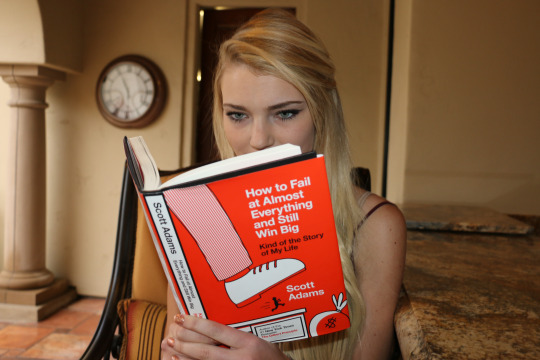

June 4, 2015
The Time I Scared a Security Guard by Being an Old White Guy
The other day I was walking through a big hotel in San Diego, on my way to give a keynote speech for a corporate event. I was the only person at the conference without an ID badge and I wondered how hard it would be to talk my way past security.
I figured it would help that a life-size photo of me as the keynote presenter was sitting in the hallway by the entrance to the conference. My plan was to wait for security to stop me (if they even noticed) then point to the poster and breeze right in.
An alert security guard picked me out of the crowd and stopped me on my approach. I smiled and introduced myself as the keynote speaker, pointing to my life-sized photo as evidence.
That didn’t work.
I could tell that the guard had specific instructions to not let ANYONE in without a badge. And he would need to leave his post to check on me, which was not an option. What to do?
There was no real problem here. All I had to do was text my contact, who was probably a hundred feet away, and he would take me in. And I was plenty early, so time wasn’t an issue. I was all smiles and understanding. Perfectly patient. I understood the guard needed to do his job and was happy to let him.
I have never seen such a frightened employee. He was clearly afraid of losing his job. Somehow my carefree attitude had scared the bejeezus out of him.
I think I know why.
As a younger man, I was dubious that my maleness and my whiteness were conferring an advantage. I did not have the option of viewing the world through the eyes of others, and from my own vantage point I saw no special treatment for YOUNG white men. You can argue convincingly that I was blind to my advantage. But my point is that whatever advantage I had was never obvious to me in day-to-day dealings. I will admit to thinking the whole white-guy advantage was overblown.
Then I got older.
I have learned from experience that no one wants to fuck with a 58-year old white guy who speaks with confidence.
When I was in my twenties, people probably assumed I was a powerless member of society, and they would have been right. The only tools I had at my disposal were my inexperienced mind and my manly muscles that I was not allowed to use in business settings. I was no threat to anyone, and no immediate benefit to anyone. My memory is that people treated me that way, i.e. like dog shit. All the time.
Now fast-forward to my current age and imagine what this security guard saw coming at him.
Several hours before a big speech I begin a process that will focus all of my energy into a one-hour block of my day. I’m in a great mood, because I enjoy speaking, but my intensity is probably palpable. And I have a confident manner in general, whether I feel that way or not. (Yeah, I know it isn’t always a good thing.)
I have realized over time that when a white male my age talks with confidence, people assume he must be a CEO of something, or important in some way. And everyone assumes that guy has weapons.
They are right. Thanks to experience, I know how to get people fired if I need to. I can send lawyers after people if necessary. I know what buttons to push and when. I know how to negotiate, persuade, threaten, and scare. I know how to get inside someone’s head and turn them inside out. I have connections. I have experience. I have resources.
In a word, I’m dangerous.
At my current age, I feel my white-guy advantage kicking in all the time. People treat me with deference and respect even if they don’t know what I do for a living. As soon as I open my mouth, people start worrying that I might be the boss of something important because of how I look and act.
The security guard eventually waved me through, but he was literally shaking by the time he decided that doing what I wanted him to do was the best way of keeping his job. And I got that just by being polite and patient. He still didn’t want to take a chance.
I’m wondering if my experience is common. I assume age confers advantages to all demographic groups. Have you found that to be true in your experience?
—
In Top Tech Blog, Google is looking to use radar to detect hand motions of users. This is part of what I call the upcoming Age of Magic, in which we all act like Harry Potter and control our environments with hand motions and incantations (voice commands).
—
—
“This is an amazing book. Especially if you have an analytical mind.” - B. Travis
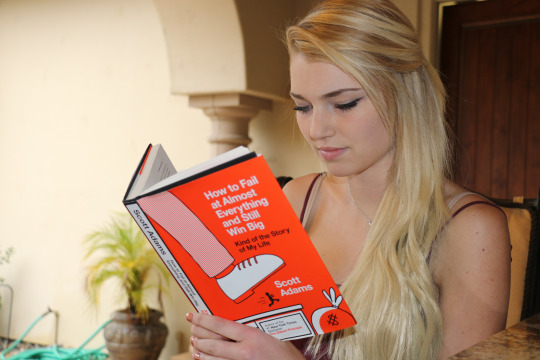

June 3, 2015
Robots Read News - About Bankers
If your corporate firewall is blocking the image, see it on Twitter here. (I can’t see the more specific link for some reason.)
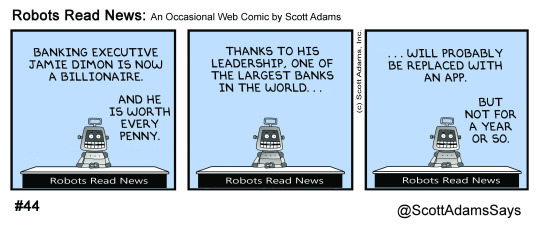
Here’s one example of an app-bank. I assume there are others.
In 2015 it could be said that banks are in the business of creating friction between customers and money, bamboozling customers into thinking the friction is somehow keeping them safe, then charging for it.
That would be an economist’s way of looking at it once there are apps that do nearly everything you want a bank to do, but without all the friction. A bank is a real business if you compare it to keeping money in a coffee jar. But if you compare it to an all-software solution, maybe with some blockchain awesomeness in the mix, then traditional banks will literally be charging customers for inconvenience.
I think existing banks will be decimated (reduced by 10%) within a year of the first app-bank that gets traction. It might take several app-banks to handle lending, deposits, money transfer, and all the rest. But there will be little need for “bankers” in the process going forward.
—
On the Berkeley Start-up Blog, see how an app and a slick device from Blowfish Health can help prevent deadly asthma attacks. I wonder what it is like to work on a start-up that could save lives. That must feel good.
—
On Top Tech Blog, new AI software can examine a photo and describe what is going on. Seems handy for blind people, but I don’t know if that application is yet contemplated.
And NASA plans to send a “flying saucer” to Mars. I guess sometimes man does bit dog.
—
Does the graduate in your life have the best career guide ever written? If not, you can fix that situation. See what other readers say.
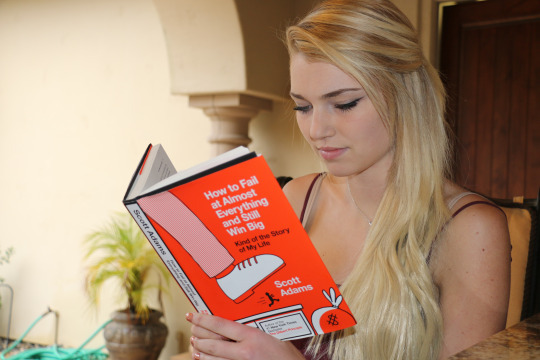

June 1, 2015
Knowledge as a Financial Asset
If someone offered you $100,000 to take a class for a few weeks, would you do it? I believe most of you would, assuming there is nothing terrible about the class itself.
But if I change the offer to say you have a 30% chance of making $100,000, would you take the class then? You should, if you need the money and you are rational. But ideally you would find a bunch of classes you could take that all have the same odds. If you take every one of the classes that have a 30% chance of giving you $100,000, one class at a time, your odds of eventually getting the $100,000 are good.
Investors know that diversifying a portfolio is the smart way to go. But does diversification have the same benefits when applied to learning? I think it does, because knowledge acts like a financial asset.
I have always looked at learning as money. I evaluate a topic for its economic potential, now and in the future. I have never taken a calligraphy class, for example, because in my case I don’t see how it would ever provide an economic return.
But years ago I did take the Dale Carnegie course to learn now to become a better public speaker. When combined with my other skill sets it probably gave me a 30% chance of earning an extra $100,000 over my career no matter what path I took. Within any group, the best public speaker often bubbles up to a leadership position.
I also took classes in my twenties to learn hypnosis. Trust me when I say that understanding hypnosis (and better understanding human minds) is worth more than $100,000 over your lifetime.
During my corporate career I signed up for a two-day class on business writing. I didn’t know it at the time, but business writing is almost the same as humor writing. In both cases you leave out the useless words and get to the point. That class was easily worth $100,000 to me because I would have used that skill no matter my career path. And it makes a BIG difference in how people view you.
My point is that some types of learning are so valuable that they should be ranked by their economic potential. In California, for example, being fluent in Spanish and English is probably worth more than $100,00 over a career, on average.
Knowing how to do A-B testing on a website is probably worth $100,000 a year.
Learning how to eat right and exercise right is probably worth more than $100,000 because we know that a person’s appearance influences opportunities. As a bonus, you will be healthier, more energetic, and smarter if you are healthier. That stuff can translate into economic value over time.
I could go on, but you get the point: Knowledge can be ranked by economic potential. And doing so would change how people approach the “extra” learning after formal schooling is done.
It seems to me that one could create a software service that would evaluate what skills you already have, along with your location, age, and other relevant economic factors, and create a learning plan that would give you the greatest odds of higher income later.
[Side note: This is a system, as opposed to a goal, because you are improving your odds without knowing where it leads.]
This way of thinking is why I almost never read fiction. One could make an argument that all reading is good for you, and any sort of mental stimulation can translate into economic potential. But I can’t justify reading something with low economic potential when I could be reading something that has greater odds of being useful with my skill set.
My hypothesis is that successful people see knowledge as a financial asset and manage it that way. They create portfolios of knowledge that make sense as a whole. You could call that a systems-view.
People who are struggling (per this hypothesis) are more likely to see the world in terms of goals. A goal-oriented person would not take a class that has unpredictable future benefits when that time could be used instead to focus on a specific goal.
So I put the question to you. Do you see learning as a system in which you create a diversified portfolio of knowledge that makes sense in your situation?
Or do you learn what you need when you need it? Let’s call that a goal-oriented approach.
—
In Top Tech Blog,
A new Internet of Things chip from Intel, an arm band that replaces your mouse, and soon your screen and camera will be talking behind your back. See it all here.
—
If you want to learn more about systems versus goals, and find out why reviewers are saying it has changed their lives, find it here.
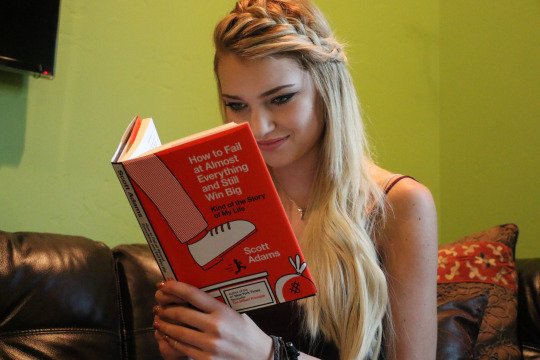

May 29, 2015
Morally Acceptable Behavior
According to this poll, a majority of Americans now find physician-assisted dying to be morally acceptable behavior.
That doesn’t mean the practice should be legal, obviously. There are lots of practical considerations. But the majority no longer sees it as a moral failing.
On a related matter, I have been noodling on the question of how best to reduce the number of coerced physician-assisted deaths in places where it is legal. There is no perfect solution, but I think social media could someday be part of it.
Coercion in this context means an unscrupulous family member or perhaps a rogue medical professional manipulates grandma into choosing death over a chance of recovery. How would that sort of bad behavior be detected?
One potential avenue for a solution could be Facebook. Let’s say I am worried about being coerced someday after my mind declines. I could put into my health directive today that physician-assisted death is off the table for me unless I have advertised it for sixty days on Facebook. In other words, everyone close to me has to hear of it in advance. Shine the brightest light on it.
The idea, poorly formed at this point, is that the more people who are watching, the less likely the bad people will have full control. And let’s say the doctors involved have to review your Facebook comments before agreeing to anything.
I would expect dissent in most situations. Family members could have lots of reasons for being opposed. But if the objections are based on morality or dignity, the doctor would be free to align with the patient’s view. If the objections look like “I think the daughter is trying to kill grandma to get the inheritance” then doctors would be able to opt out or require a more rigorous third-party review.
As someone here pointed out, a relative can coerce grandma to change a health directive too. But I think health directives should always show the chain of decisions, not just the current document. Any change to the physician-assisted dying directions should be automatically reviewed by third-parties for signs of coercion.
There is no way to drive the risk of coercion to zero. But the biggest risk is a rogue relative or two operating in the shadows. A Facebook requirement could fix some of that.
I think the coercion risk is real, and it might increase over time as more seniors enter the final years and overload the system. But I also think we could be more clever about reducing that risk with these two tweaks:
1. Flag any changes to a person’s health directive.
2. Post on Facebook your intent to pursue physician-assisted dying, 60 days in advance.
3. Automatic third-party review if the directive on physician-assisted dying has changed, the Facebook option is ignored, or there are questionable comments from friends and family.
I believe anyone could put a Facebook requirement on their health directives today. All it needs to say is that you want the doctor making the decision to review the relevant posts to look for evidence of coercion.
This idea is slightly less than half-baked. I’m hoping you can improve it.
Scott
In Top Tech Blog…
Can a phone partially recharge itself by sucking up its own radio transmission energy? Apparently so.
Now robots are training humans. If those robots ever figure out we like treats, you’ll be wearing a leash in fifteen years.
Soon we will be printing human skin to help burn victims. I might be getting ahead of myself, but this seems one step closer to the ultimate lonely-guy fantasy of printing your own girlfriend.

May 28, 2015
Robots Read News - about FIFA
If your firewall is blocking the image, see it on Twitter here.
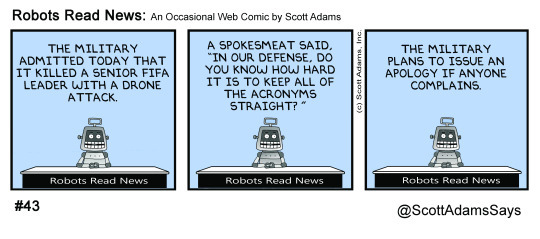
In Top Tech Blog…
Use a 3D printer to make prosthetic limbs. Google want the world to have this capability and soon.
Now we can brainwash poor people from space!
And the electric-powered helicopter-airplane is coming. Let me know when Uber starts flying them.

May 27, 2015
Dignity and Other Obstacles to Success
In my recent post on physician-assisted death, in which I ran the debate through the so-called Rationality Engine, some of you were disappointed that my verdict was not a verdict. My summary was that a person who values human dignity above freedom could rationally be opposed to physician-assisted death, and vice-versa.
A person of faith, for example, might value human dignity higher than freedom because God graced us with the former but mere human laws define our freedoms. One might say a big point of religion is to constrain human freedoms (especially the bad impulses) to preserve human dignity and in that way show respect for one’s creator. I found this reasoning to be sound if you start with the assumption of a creator with a personality that we can understand, and who has needs/requirements that we can fulfill for our own eternal good.
But one need not be religious to find value in human dignity. An economist could easily argue that the world operates better if we assign value to human life. That probably helps to keep us from slipping into cannibalism.
On the other hand, if you value freedom higher than human dignity, you probably think it makes sense to skip some agony toward the end of life and manage your own graceful exit. According to this way of thinking, human dignity is enhanced by the freedom to engineer your own exit.
Personally, I think human dignity is one of the biggest obstacles to happiness, wealth, and success. I often credit my career success with a complete lack of human dignity.
For example, if you take the Dale Carnegie course, as I did, part of the training involves acting silly in front of a crowd in order to release your dignity. Once you realize that your fear of losing face is the only thing making you nervous, you relax and things flow easily. Releasing my dignity has allowed me to make a fortune on the speaking circuit. I have humiliated myself in front of crowds a number of times. That’s how one improves. And my willingness to take that sort of risk is a big part of what puts me in a rare zone, fee-wise.
I often credit the success of Dilbert with my total lack of artistic integrity. I launched the strip as a generic comic about a guy that happened to be an engineer, but for the first year or two I focused on his home life. I was surprised to learn that readers preferred my infrequent workplace jokes to my generic humor, so I turned Dilbert into a workplace comic. Success followed. I treated my art like any other product and gave customers the features they demanded.
To put it bluntly, I traded my artistic pride for a better business model. Readers were glad I did. And that made me happy too. I keep looking for the downside of giving up my artistic ego but I can’t find it. And more generally, every time I give up some dignity (”sell out”) I seem to come out ahead. I see that pattern in other people’s lives as well.
After a lifetime of observation, it seems to me that dignity in all its forms can be one of the most pervasive obstacles to success. I assume that is because human dignity is hard to separate from ego, pride, artistic integrity, fear of failure, and a lot of other obstacles that successful people try to avoid. All of those limiting emotions spring from the idea that you are special.
In the case of physician-assisted dying, for example, a high sense of human dignity could sentence millions of sufferers to a living Hell.
For practical reasons, I believe we should treat each other well, even when no one is watching. Human dignity adds nothing to that world view. Moreover, I have seen ego, dignity, and pride ruin lots of lives. I would go so far as to say that unless you have health issues, or you are unfairly imprisoned, the only thing that can keep you from happiness is an inflated view of your own self-worth.
Sometimes life requires that we take jobs below our station until we learn skills, offer apologies even when we are wronged, suck-up to power when necessary, work long hours when we “deserve” some rest, risk embarrassment in front of witnesses, risk failure and humiliation, and get rejected by the people we hope to love. In that sort of game, the player unburdened with human dignity usually wins.
Human dignity is, to a large degree, what made both of my parents suffer needlessly at the ends of their lives. I’m quite done with that form of magical thinking. And if California lawmakers decide I will not have a legal right to physician-assisted death, should I someday want it, I still have the right to own a gun, and that means I get to choose my exit.
If I find myself in unbearable pain toward the end of my days, and knowing my personality, there is a non-zero chance I will Uber to Sacramento and spray my brains all over the steps of the state capital just to make a point. It won’t be a dignified way to go, but still far better than dying like a sheep because other people believe they are special.
—
Did you ever want to make a jet engine with your own 3D printer? Me neither, but it impresses the heck out of me that it can be done.
And what could be creepier than a robotic teddy bear that watches you and reacts to your voice commands? Not much. Seriously, I’m drawing a blank here.
And how about a hobby drone that is gas-powered for extra awesomeness? Can it go get gas on its own?
—
Scott
Dilbert on Facebook
#compassionandchoices #dignity #physicianassisteddeat

Scott Adams's Blog
- Scott Adams's profile
- 1258 followers



